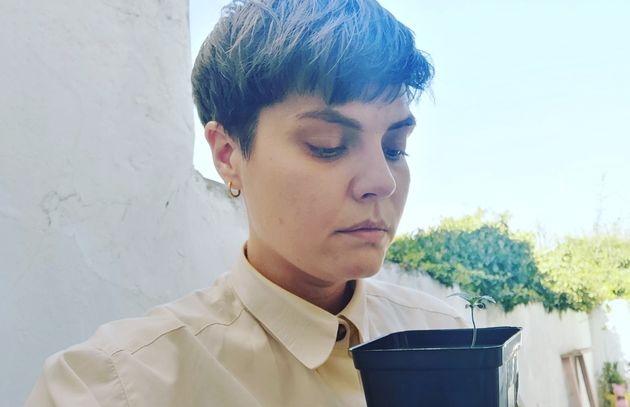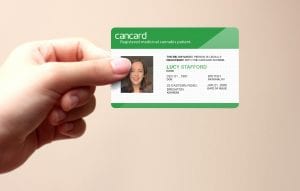
Medical cannabis patient Carly Barton has been working to create the UK’s new medical cannabis card that will protect patients from prosecution and save police time and resources.
The new UK medical cannabis card, Cancard, is an initiative aimed at providing medical cannabis patients with protection from prosecution. Patients who have been prescribed medical cannabis for their conditions will be eligible for the card, which has gained wide institutional backing from drug reform groups across all parties, the Police Federation of England and Wales, the National Police Chiefs Council, The Police Foundation, anti-corruption and organised crime police officers, members of the House of Lords, and barristers.
The card, which has fed into a recent Conservative Drug Policy Reform Group policy meeting discussing recommendations on drug reform, has already seen interest from more than 10,000 patients across the country.

Protecting patients
Following the legalisation of cannabis for medical purposes in 2018 there have been only a handful of medical cannabis prescriptions written, which are only available through private, specialist GPs, as the NICE guidelines do not recommend funding for cannabis prescriptions. Barton was the first patient in the UK to be prescribed medical cannabis at a cost of £1,500 for one months’ worth of medicine, equating to 30g. Carly’s request for NHS funding of the prescription was denied.
Barton said: “The current block lies with the NICE guidelines, as they are not recommending funding for cannabis-based prescriptions – so mine was blocked. I access my medicine through a combination of growing my own and illicit market use, which means I can get the strains I need, and my health is good. The only stumbling block was that I was still considered a criminal in the eyes of the law, despite the fact that I have a condition that legally qualifies me for a prescription.
“At the moment, we are in a situation where there is two-tiered access, even though costs for prescriptions are coming down. It is much cheaper for patients to source their own supply. These people are often on low income, often vulnerable people, and they do not need to be living in fear of criminalisation just for taking a medicine that supports their health. So, the question is should these people be criminalised for using a medicine that is being prescribed privately to people who can afford it? I think the answer to that is no.”
Medical cannabis expert and neurologist, Mike Barnes of Maple Tree Consultants, commented: “The NHS is not funding prescriptions at the moment because of the NICE guidelines – they don’t think there is enough evidence to prescribe it yet. Those guidelines are not mandatory, but in practice they stop doctors prescribing. You have to also get approval for the prescription from a medical director.”
Helping police
The card would provide information for the police to confirm a person is a medical cannabis patient, protecting them from any potential prosecution. Barton is working with the police to make the card safe, legitimate, and easily verified on the street, and to offer national guidance which will give officers the confidence to use their discretion when they are presented with a Cancard. This guidance will go out nationally to every police force.
She said: “There is going to be two ways of verifying the card. To start, it will be impossible to get around the application process because there is no way you can forge it – it goes straight from the GP to us, so there is no room for interference. The other concern would be of fake cards turning up on the street, so the card will come with an FRID chip. The patient would have access to the app on their phone – which includes information such as a stop and search guide – and they would tap their own card on the app which would come up with a verification for the police.
“If the police are still struggling or have missed the briefing, for example, there will be a helpline number they can ring. This is similar to how car insurance details are checked – a process that the police are familiar with.”
“The Cancard gives you cover if you are caught in possession of, or growing, medical cannabis, from a reasonable standpoint. It effectively decriminalises the use of cannabis for medical purposes,” said Barnes.
“There are some people who can’t afford medical cannabis prescriptions, and other people that prefer to grow their own – which I understand and sympathise with because the type and range of products available in the UK are fairly restrictive compared to countries where it has been legal for a longer time like Canada. For experienced users, and quite rightly, the product range is not right for everybody – so some people want to grow their own particular strain that suits their particular condition which they cannot get otherwise. It is still illegal to grow your own cannabis without a Home Office licence, but it gives the police discretion on who to prosecute.
“There is a bit of a postcode lottery right now. If you live in Durham, the police will not prosecute you, but if you live in Northumberland next door, you will be prosecuted. So, this will hopefully save the police a lot of time on unnecessary investigations and prosecutions. At the moment there is an 80-year-old man with terminal kidney disease who is being prosecuted in Cornwall, for example – this is a waste of prosecutors’ time and energy for growing his own cannabis for his condition.”
Educating GPs
The card has also been designed to try and build education within the UK’s GP network. Patients will be able to speak to their GPs about medical cannabis prescriptions or contact Cancard who will then contact the GP surgery – while maintaining patient anonymity.
“GPs, from my experience, are feeling quite frustrated and left out of this conversation. There are two demographics of patients, patients who will be and are open with their GP about their cannabis consumption, and other patients who struggle to have the conversation because they have had a bad experience in the past, or their GP isn’t on board with it as they are still heavily weighed down by the harms over benefits,” said Barton.
“GPs will be able to sign a form to confirm their patient has one of the listed conditions and would then receive a host of resources about cannabis medicines and GP networks, where they can learn about it. Alternatively, patients who are struggling to have that conversation with their GP have a legal right to request a summary of notes which is signed by a GP and stamped in surgery. This would provide a summary sheet that confirms they have one of the listed conditions. Cancard would log which surgery that came from, then unsolicited and unconnected to the patient, we would send an information pack to the surgery about cannabis-based medicinal products as this is a flag for us that there are GPs in that surgery that don’t want to have that conversation.”
Barnes added: “This will be a very valuable database for cannabis producers so it is key that this data remains confidential and should not be made available to big cannabis companies. A big well done to Carly for getting this project this far.”
Breaking down stigma
Despite its legalisation for medical use in the UK, a large stigma remains around cannabis – making it difficult for patients to be open about their use and to speak to their doctors. The card aims to help break down this stigma and allow patients to use their medicine with peace of mind.
“The obstacles that we are seeing – even in the big institutions such as the NHS and NICE – in terms of society’s general viewpoint, is changing. However, those blocks are down to stigma. Cancard was designed to help patients’ peace of mind because I don’t believe that patients that are already vulnerable and unwell, and who have made a decision about their own health, should feel stigma or should be worried to go to the shop because they can’t take their vapouriser, or might limit the amount of medication that can help them just to appease out-of-date ideals about what cannabis is and what it can do for people.
“I hope that the card will get us to a point where patients are no longer living in fear and whereby, we address some of the institutional and societal stigma around consuming cannabis sensibly and safely and in a medicinal context.”
Cancard is currently accepting registrations and will be launched on 1 November 2020.


















